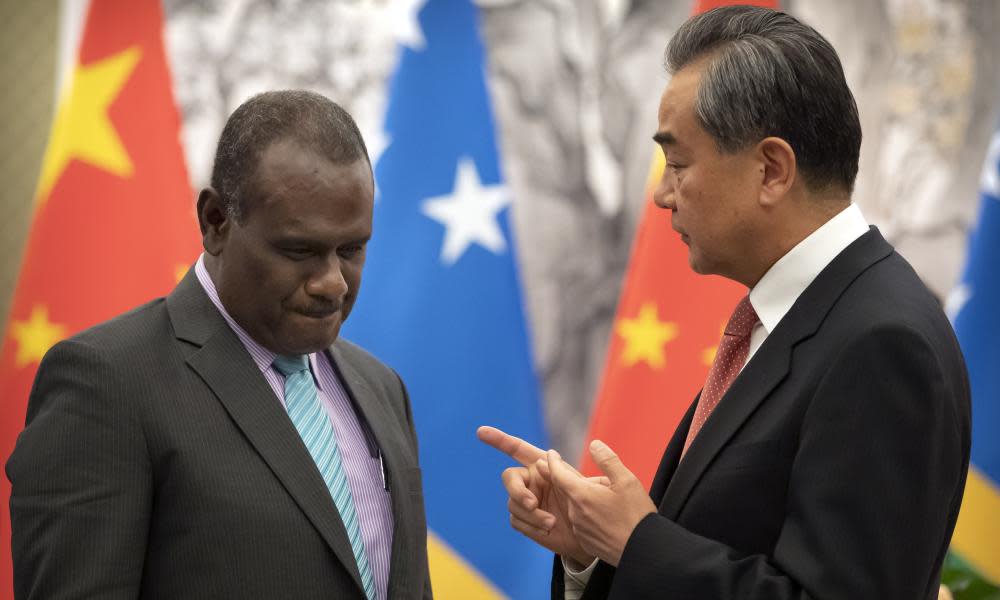Deal proposed by China would dramatically expand security influence in Pacific

China is pursuing a sweeping regional economic security deal with Pacific nations that would dramatically expand its influence and reach into those countries, in a pact that has western countries and some Pacific leaders deeply worried.
The wide-ranging deal lays out China’s vision for a much closer relationship with the Pacific, especially on security matters, with China proposing it would be involved in training police, cybersecurity, sensitive marine mapping and gaining greater access to natural resources.
A draft of the deal, written in a similar style to the controversial bilateral security deal signed by Solomon Islands and China last month, and a five-year action plan, both of which have been obtained by the Guardian, cover a huge range of issues, including trade, financing and investment, tourism, public health and Covid-19 support, establishing Chinese language and cultural exchanges, training and scholarships, as well disaster prevention and relief.
Related: Solomon Islands journalists shut out of China foreign minister visit, raising secrecy concerns
The agreement will be discussed by Pacific leaders and Chinese foreign minister Wang Yi, who has embarked on a marathon tour of the Pacific, visiting eight countries in 10 days. He meets with his Solomon Islands counterpart on Thursday.
China is hoping the deal will be signed by 10 Pacific countries in Fiji next week when Wang hosts the second China-Pacific foreign ministers meeting.
Australia’s new foreign affairs minister, Penny Wong issued a statement in response to news of the draft agreement: “China has made its intentions clear [but] so too are the intentions of the new Australian government.”
She will travel to Fiji on Thursday in an early sign of her determination to deepen the relationship with Pacific countries.
On Twitter, Fiji’s prime minister Frank Bainimarama, said he would meet Wong on Friday and Wang on Monday. In a clear reference to the proposed deal, he wrote: “I’ve been asked about Fiji’s agenda. At all tables, what matters most is our people and our planet, as well as respect for international law.”
The deal reiterates China’s commitment to doubling bilateral trade volume by 2025 compared with 2018, and also promises to give an additional $US2m to Pacific island countries for Covid relief, as well as sending 200 Chinese medical personnel to Pacific countries over the next five years. China is also offering 2,500 government scholarships to the region and will send 5-10 art troupes to the islands, pending Covid rules.
A key focus of the proposed deal is China’s involvement in Pacific security.
The arrangement would see a dramatic expansion of China’s engagement with policing in the region, with the draft deal proposing to “expand law enforcement cooperation, jointly combat transnational crime and establish a dialogue mechanism on law enforcement capacity and police cooperation.”
It puts a significant focus on China training Pacific police forces, something it is already involved in across the region, with China proposing to hold “intermediate and high-level police training” for Pacific island countries and as a matter of urgency to “hold the first China-Pacific Islands Countries ministerial dialogue on law enforcement capacity and police cooperation” later this year, as well as helping to construct laboratories for fingerprint testing, forensic autopsy, drugs, electronic and digital forensics.
The agreement also looks to strengthen cooperation on “cybersecurity” and promoting “formulating rules for global data governance”.
The deal proposes the promotion of trade between the countries, including exploring the possibility of establishing a “Free Trade Area” with Pacific nations. As well as seeking to expand mutual cooperation in the fields of infrastructure, energy, mining, IT, e-commerce, agriculture, forestry and fishery, China hopes for more direct investment in Pacific countries from “reputable Chinese enterprises”.
In a proposal that will raise concerns, China also proposes jointly producing a “maritime spatial plan” and being involved in sensitive marine mapping, as well as allowing China to gain greater access to natural resources.
Related: The $3bn bargain: how China dominates Pacific mining, logging and fishing
China already dominates the resource extraction industries in the Pacific. A major Guardian investigation last year revealed that China received more than half the total tonnes of seafood, wood and minerals exported from the region in 2019, a haul worth $3.3bn that has been described by experts as “staggering in magnitude”.
A survey of boats operating in the Pacific in 2016 found that China had 290 industrial vessels licensed to operate in the region at the time, more than a quarter of the total, and more than the 240 from all the Pacific nations combined.
However, some Pacific leaders have reacted strongly to the deal.
In a letter to 21 Pacific leaders seen by Reuters, David Panuelo, the president of the Federated States of Micronesia (FSM), which will be holding a virtual meeting with Wang, said his country would argue the “pre-determined joint communique” should be rejected, because he feared it could spark a new “cold war” between China and the west.
A senior diplomat in the region told the Guardian some leaders had “big concerns” but “there has been a vacuum left in this region from traditional partners – they have to work extra hard to win back the hearts of Pacific people”.
The diplomat said the deal was not guaranteed. “We will work through our regional architecture to ensure security and stability of our region is maintained under international law.”

 Yahoo Movies
Yahoo Movies 
